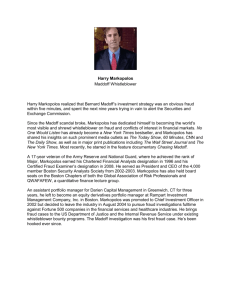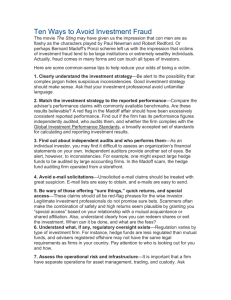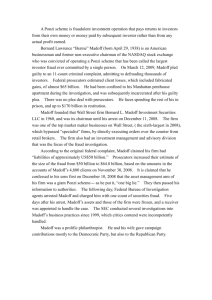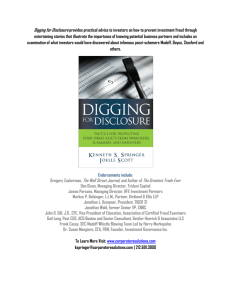File - Jian Yu Li Eportfolio
advertisement
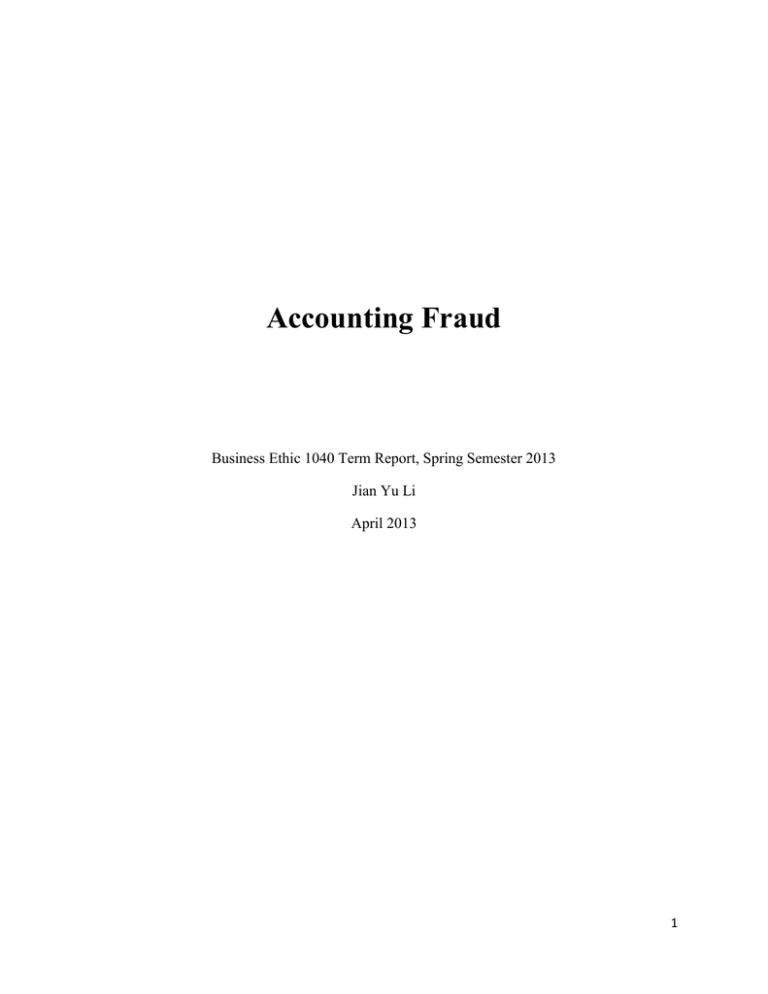
Accounting Fraud Business Ethic 1040 Term Report, Spring Semester 2013 Jian Yu Li April 2013 1 Accounting Fraud INTRODUCTION This reporting is my findings on the topic of accounting fraud in business for my Spring Semester 2013 Business Ethic class. This is an important topic because accounting fraud can have a huge impact on the company or other small business and it can also affect a lot of people. After a fair amount of research, I find accounting fraud to be a universal issues that has the power to affect everyone. This report will be focus on: Different types of accounting fraud and how they are carried out How accounting fraud affects business Accounting fraud as the subject of ethical consideration I was aided in my research through a discussion with Paige Paulson, a professor of accounting at Salt Lake Community College, who helped me understand accounting fraud better. My research begins with a chapter out of the text book Principles of Financial Accounting Weygandt, Kimmel, and Kieso and with the information from the following: http://tgg-accounting.com/blog/2011/10/common-accounts-receivable-fraud-in-smallbusinesses/ http://www.mcgoverngreene.com/archives/archive_articles/Craig_Greene_Archives/FocusEmployee_Frauds.html http://www.nytimes.com/2008/12/20/business/20madoff.html?em&_r=0 2 Findings Looking at accounting fraud The numbers of accounting fraud in small business or corporation is immense. Like all other frauds, accounting fraud is committed in the attempt of increase profitability and/or personal gains. According to businessdictionary(2013): The intentional misrepresentation or alteration of accounting records regarding sales, revenues, expenses and other factors for a profit motive such as inflating company stock values, obtaining more favorable financing or avoiding debt obligations. Employees who commit accounting fraud at the request of their employers are subject to personal criminal prosecution and they can commit account fraud through overstating revenue, understating expense, underreporting the existence of liability or overstating the value of business’s assets. Different Types of accounting fraud There are a lot of place in business where accounting fraud can happen. Some kind of fraud are far more easy to commit than others and require less time to commit and involve less chance of getting caught. The most common places where the crooked boss or employee can manipulate the records are: Cash, Accounts Receivable, Accounts Payable, Inventory, Prepaid Expense, and Revenue. Cash is a major part of small business’s asset but it is one of the easiest areas that accounting fraud takes place, and it is extremely difficult to detect. One of the most common methods of accounting fraud in cash is called “Skimming.” This occurs frequently in the retail industry during the sales when an employee receives cash payment from customers. The reason this is 3 difficult to detect is that the fraudster does not leave an audit trail and the cash is stolen before it is documented in the organization’s record. Accounts Receivable is the money due to the company from its customers and it is one of the most popular areas where accounting fraud takes place, because it can be manipulated easily through a variety of schemes and employees at any level in an organization can perform the commission of account receivable fraud. One of the most common account receivable frauds is “lapping”, it involves stealing customers A’s payment and applying it to customer B’s open account receivable. This creates a “lapping” effect and covers the original theft with subsequent customer payment and it is the most difficult fraud to detect. A company can also use Accounts Receivable to create a fictitious account and sale; the motive behind this is to create an illusion to have the company appear to be in better financial condition or to receive additional compensation(The TGG Way, 2011). Accounts Payable is money owned by a company to its creditors and accounting fraud can happen here easily if a company lacks good internal controls. A common way Accounts Payable fraud is perpetrated involves setting up a ‘bogus’ supplier in the accounting system, that is used to supply fake invoices for payment and then transferring funds from the company’s bank account to another bank account, which is usually that of an employee within the company. Another fraud is where Accounts Payable staff use genuine suppliers to buy goods and products from for their own personal use and pay for them with company funds (Edward James, 2010). 4 Inventory is probably one of the easiest places for employees and companies to commit accounting fraud. One of the most common schemes is appropriating inventory for personal use, also called theft. This is rather common in the retail industry; employees can easily steal business goods for personal use or resale. Companies can also commit inventory through manipulating their financial statements, such as overstating the inventories, understating the cost of goods sold. For example, if you own a company that sells only Ipads, you tell your investors, the public, and creditors, that you have 2000 Ipads when the actually inventory is only 1000. The reason for this is to create an effect of reporting higher profit and higher earnings to satisfy stockholders, achieve additional compensation, or maintain bank lending covenants (Chris Hamilton, ND). Prepaid Expense fraud can happen when a company understates current-year expenses by claiming they are prepaid expenses. This amounts to a fraudulent claim that payments for a certain service benefit future accounting periods when, in fact they do not. Recently a large telecommunications company incurred significant cash expenses on maintenance of its utility lines. It fraudulently classified most of the outlays as prepaid expense, rather than current period expense. Since prepaid expenses are recorded as an asset rather than an expense, expenses were understated; hence, profits were overstated (Elmaleh, 2006). The most common financial statement fraud in accounting is the manipulation of the revenue. A company can easily overstate its revenue and understate its expenses to make their profit seem higher. Another method of revenue fraud is through deferred revenue. This is when the company records the profit before it is earned. Companies can take advantage of this because it is very difficult thing to detect. Often, the real profit falls below the company’s expectation. As most 5 company transaction records are estimate, they sometimes include a projected profits as earnings in their records (Tracy Coenen, 2013). Madoff’s Ponzi scheme According to the New York Times magazine, Bernie Madoff is an American, a former stockbroker, investment adviser, and financier. Who became the executive chairman of the National Association of Securities Dealers Automated Quotations (NASDAQ) stock market in 1990. Mr. Madoff set up his small trading firm in Wall Street and intended to make a business out of trading in 1960 at the age of 22, and by 1989, Mr. Madoff’s firm was handling more 5 percent of trading volume on the New York Stock Exchange. Later on, Mr. Madoff became the executive chairman of the NASDAQ (Diana Henriques, 2008). Unlike other prominent Wall Street figures who build their fortunes during the heady 1980s and ‘90s, or become a household name among American investors (NY Times magazine, 2009). Mr. Madoff is actually a local hero, he often donate large amount of money to charity and later on became the money manager of choice for many prominent regional charities. And that’s when the Ponzi Scheme begins, in the early 1990s. According to New York Times Magazine, Mr. Madoff starts the Ponzi scheme by using the money from the members of country clubs and charity dinners, where investors meet and asked him to manage their life savings so they too could have a steady, solid return like many other people who asked Madoff to manage their life savings. With charging 5 to 6 percent of investors’ returns, 2 percent higher than the standard rate, and also with the stead and solid returns, a lot of investors asked Madoff to manage their life savings. As Mr. Madoff’s Ponzi Scheme grew, he had to move beyond country clubs and charity dinners to bring in fresh money to pay his 6 previous investors, so Mr. Madoff and his promoters set their sights in Europe, framing the investment as membership in select clubs using the same method. As the Ponzi Scheme grew bigger and bigger, Mr. Madoff cut a cash-gathering swath through the Persian Gulf, then South East Asia, then finally, they were hurtling towards China with undignified speed, where people are desperate to asked Madoff to manage their life savings. But it’s not long before the Madoff’s Ponzi scheme come to an end. When everyone face a financial crisis in 2008 and was reaching for cash, that the investors starting to take out money faster than Mr. Madoff could bring fresh cash in. according to New York Times, on December 9, 2008. Mr. Madoff told his son Mark that he planned to pay out $173 million bonuses two months early, telling Mark Madoff that he had recently made some profit through business operations. Then, Mark spread the news to his brother, Andrew Madoff. The very next morning, they went to their father’s apartment to ask him how he could have enough money to pay his staff when he didn’t have the money to pay his clients. Facing his sons’ doubts, Mr. Madoff told them that he had nothing left, that his investment fund was nothing but a lie, it was just a big Ponzi Scheme. Madoff’s sons then reported their father to the federal authorities. Madoff was arrested on December 11, 2008. And according to the federal investigators, Mr. Madoff never used the money from his investors to engage in legitimate investing activities. Also, the amount of money missing from clients’ accounts, including fabricated gain, was almost $65 billion. The court-appointed trustees estimated that the actual loss to investors was $18 billion; on June 29, 2009, Mr. Madoff was sentenced to 150 years in federal prison (New York Times, 2009). Up until this point in history, it was the biggest Ponzi Scheme that ever happened and the consequences were great; a lot of people lost their life 7 savings, billions of dollars vanished in a blink of an eye, and some lost their jobs and families and some even lost their futures due to a single man’s greed. Accounting Fraud and Ethics Dishonesty is one of the most unethical aspects in humanity; according to research, a person on average lies about 20 times a day, even if they didn’t realize it. It is over looked on a daily basis and dishonesty can be easily adapted into the business world. But the case of Madoff’s Ponzi schemes is not ignorable, with multiple billions of dollars being stolen from people’s life savings and ruining people’s lives. This kind of fraud is still being practiced out there in the world as we live in today. This type of dishonesty that involves accounting fraud is practically a faceless crime. Although it doesn’t seem likely to harm anyone and that everyone would get over it, the world we live in today runs by money. And with people’s lifesavings being stolen, the impact on an victim can be huge. In the case of Madoff’s Ponzi, a lot of people were forced to leave their homes because Madoff stole their life savings. In this case, the motive behind being dishonest is obvious, for personal gain. It is often greed that pulls us towards dishonesty, the very same reason why businesses would do the same to their investors: to gain profit and additional compensations. However, if it is wrong for a person to be dishonest for personal gain, then is it not eh same with business? Many businesses claim that they are honest when in fact they are deceptive; those who knowingly practice deceit are unethical. Many Philosophers suggest that lying is a betrayal of trust, of the moral code that governs our existence. In the world we live in today, people choose to be dishonest for personal gain rather than to honor the moral code of honesty, even a wellknown philosopher agrees: 8 Good people do not need law to tell them to act responsibly, while bad people will find a way around law (Plato, 2013). If a man is proud of his wealth, he should not be praised until it is known how he employs it (Socrates, 2013). On the other hand, Immanuel Kant has a different view of deceit; he claimed that lying is wrong independent of its consequence; for example, you can save a person’s life from a person who tries to murder him or lie to a person for personal gain. The main point is that lying itself is wrong but the consequence can be either good or bad. Conclusions Before I research this topic, I was aware that accounting fraud can affect a lot of people within the nation or the business firm itself, but the effect is even greater. The aftermath of accounting fraud can have a huge impact on the economy and it can even affect everyone globally. We live in the word where tons of crimes take place, so much more than in the history of the nation and the world; these crimes are often committed in the name of person gain or profit but the cost is often great. With thousands and even millions of people filing bankruptcy due to the greed of others, fraud is the violation of our moral code. After all the findings, I came to the conclusion that it is easy for people and companies to commit fraud in the name of personal gain or profit rather than to honor the code of honesty. In the case of Madoff’s scheme just prove that, instead of using the investor’s lifesavings to engage in a legitimate investing activities, Mr. Madoff use that money for personal gain in the cost of other people’s lifesavings and even their futures. 9 Resolutions I understand that the world we live in today sometimes force us to be dishonest for the good of others or to survive but we don’t want to live in a world where we all choose to be dishonest to others for personal gain or profits. Practicing accounting fraud is a careful calculation, and manipulate the books to gain profit or personal gain will end up betraying integrity, trust and all the people that work so hard to make economies prosperity achievable. It is logical that no corporation is satisfied with its own profit when there is a chance to make more, and few man and woman can stand outside the influence of money. At the end, a corporation isn’t able to commit accounting fraud without people; it is the people who choose to commit accounting fraud. Although it is easy to be dishonest for profit or personal gain, the real crime is the acceptance of being dishonest are right; like all other crime, it is possible to train the eyes and the mind to ignore or walk away from unethical. 10 Sources Cantoria, C. (n.d.). Retrieved from http://www.brighthub.com/office/finance/articles/95378.aspx Greene, C. L. (n.d.). Retrieved from Codjia, M. (n.d.). Retrieved from http://www.ehow.com/info_7759266_fraud-affects-accountingequation-business.html Edward James. (Sept 17, 2010). How Fraud can affect a small company. Retrieved from http://business.wikinut.com/How-accounts-payable-fraud-can-affect-small-companies/3.89ml2t/ Elmaleh, M. (n.d.). Retrieved from http://www.understand-accounting.net/Accountingfrauds.html Greene, C. L. (n.d.). Retrieved from http://www.mcgoverngreene.com/archives/archive_articles/Craig_Greene_Archives/FocusEmployee_Frauds.html Hamilton, C. (n.d.). Retrieved from http://www.arxisfinancial.com/images/pdfs/Inventory_Fraud.pdf Henriquez, D. . Retrieved from http://www.nytimes.com/2008/12/20/business/20madoff.html?em&_r=0 Jake Cavanagh. (n.d.). Retrieved from http://tgg-accounting.com/blog/2011/10/common-accountsreceivable-fraud-in-small-businesses/ TGGWPADMIN. (n.d.). Retrieved from http://tgg-accounting.com/blog/2011/10/common-accountsreceivable-fraud-in-small-businesses/ Tracy Coenen. (n.d.). Retrieved from http://www.allbusiness.com/company-activitiesmanagement/financial/8884142-1.html US SEC. (n.d.). Retrieved from http://www.sec.gov/answers/ponzi.htm Zouzias, C. (n.d.). Retrieved from http://www.zouzias.com/custom13.php 11
